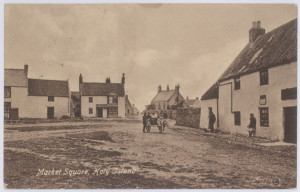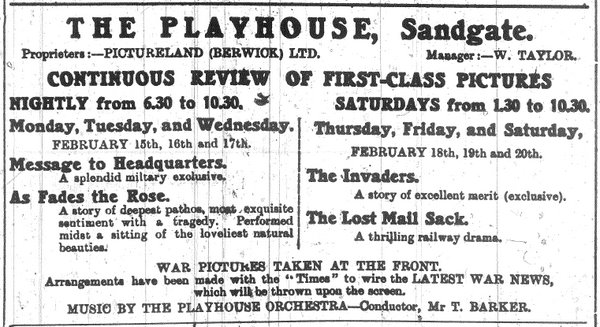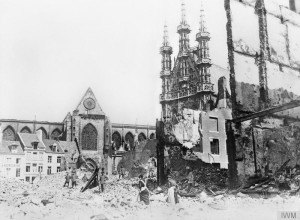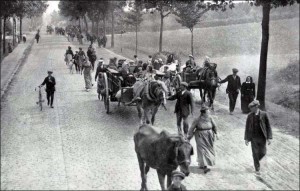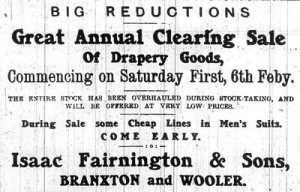BERWICK ADVERTISER, 19 FEBRUARY 1915
CHATTON
Patriotic Meeting,-The Rev W. Thorp, M.A., gave a lantern lecture on “Early Stages of the Great War,” in the course of which about seven dozen slides were used to illustrate the various aspects of the conflict. Mr J.R. Marshall, of Chatton Park, the chairman, referred to the suitability of the financial object of the meeting, namely; the helping of Belgian refugees, who will benefit to the extent of £4 as a result. A feature of the meeting was the presence of four Belgian soldiers at present being cared for in their convalescence at Hetton House by Mrs L.H. Leather-Culley, who along with some of her Red Cross nurses, accompanied them.
LOCAL NEWS
Vessels Ashore.-About 5 a.m. on Tuesday morning the steamship “C.H.R. Christesen” of Copenhagen, 911 tons, and built in Flensburg in 1903, which was bound from Aarkuus for New York, via the Tyne, in ballast, ran ashore on the Longstone Point. The vessel was badly holed and is likely to become a total wreck.
The Holy Island lifeboat was launched at 6.15 a.m. to assist in landing the crew of nineteen on the Longstone. The crew were brought to the mainland by the Seahouses lifeboat and Berwick Harbour tug.
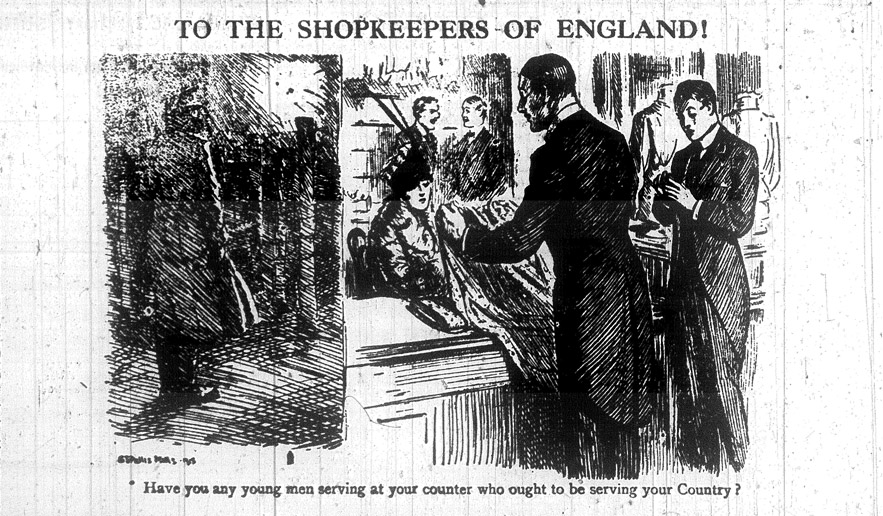
TWEED SALMON FISHING SEASON OPENS
Salmon fishing commenced on the Tweed on Monday morning, but the opening was not particularly bright, and only a few fish were caught. In the Norham district the opening was decidedly disappointing. Salmon sold on Monday at 2s per lb, this being the same as on the opening day last year. The fishing at the river mouth stations this year will be rather handicapped owing to the military authorities prohibiting fishing at these stations at night.
There has been no improvement in the fishing since Monday. On Thursday morning there was a spate in the river and in consequence of this the stations in the lower reaches were not working. Salmon was sold on Thursday at 1s 9d per lb. against 2s on the corresponding day last year.
ITEMS OF INTEREST
A parcel of cigarettes sent by the household servants at Wooperton (through Mr R. F. Henderson, Wooler), has been acknowledged by the “C” Squadron Northumberland Hussars Yeomanry, and were much appreciated.
The 7th Welsh Territorials, who have been stationed at Berwick on coast defence since August, are preparing to leave the town for another station in the south. The men have become very popular during their stay in the town and their vocalists have taken a prominent part in many local concerts.
An armoured motor car attached to the Highland Light Infantry, stopped in Berwick on Wednesday evening for a short time on its way north. This is the first armoured car to pass through Berwick, and it attracted a good deal of attention.
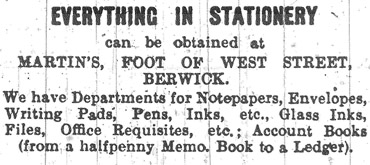
A MARTIAL DISTINCTION TO AN OLD CONTRIBUTOR OF THE “ADVERTISER”
Thomas Burns, F.R.S.I., who has been a highly appreciated contributor to our columns for many years, and much of whose poetry has been published in book form, has just received a special letter of thanks from Lord Kitchener’s, from the War Office, London, for his poem entitled “The March of Kitchener’s Army,” which appeared in the “Advertiser” on the 5th of the present month.
During recent years there have been many honours showered upon our author in recognition of his labours in the sphere of poetry, and happily amongst them, compliments from sovereigns, scientists, philosophers, divines, and fellow poets, and other literateurs of the highest distinction.
But a recognition by, and a special letter of thanks from the superman of the moment, and such a moment, pregnant as it is with world wide destinies, which has enveloped and may constitute new boundaries, and determine vastly different conditions of life throughout the whole civilised world: such an honour is well fitted to bring a glow of pride that will kindle a new flame of courage in the poet’s heart though the fact remains, that since the beginning of time, the poet and the warrior have ever fought shoulder to shoulder on the same plane for the uplifting of humanity and for the light and liberty of the race.


